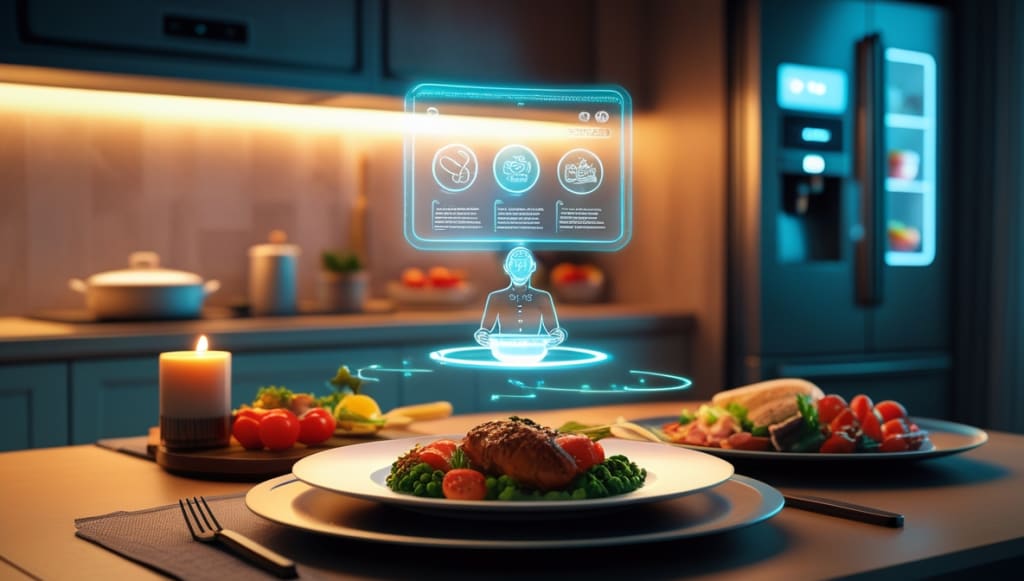Tech Meets Taste: How AI Is Powering Smarter Catering Operations


KEY TAKEAWAYS
- AI personalization tailors menus, suggestions, and payment experiences to customer preferences in real time.
- Predictive inventory systems using AI reduce food waste by up to 25% through accurate demand forecasting.
- AI-powered kitchen management improves workflow efficiency, staff scheduling, and food securety compliance.
- Intelligent logistics algorithms ensure timely, cost-effective, and sustainable delivery operations.
- Data analytics tools drive better decision-making, pricing strategies, and marketing personalization.
- AI adoption boosts profitability while supporting environmental and regulatory sustainability goals.
In 2025, (AI) continues to reshape the catering industry, transforming operational efficiency, customer experience, and sustainability in unprecedented ways. By integrating AI technologies into ordering, kitchen management, inventory control, and delivery logistics, caterers are able to meet rising consumer expectations, optimize resources, reduce waste, and increase profitability.
This convergence of technology with culinary arts is ushering in a new era of smarter, data-driven catering operations that blend tech innovation with the art of taste.
AI-Driven Customer Experience Personalization
Modern catering businesses leverage to offer highly personalized and seamless customer experiences. AI-powered order terminals and mobile apps analyze customer preferences, seasonal trends, weather conditions, and real-time inventory to suggest customized dishes or combos.
For example, an AI system might recommend hot beverages during cold weather or refreshing smoothies on a hot day, anticipating and satisfying consumer desires.
Interactive menus evolve dynamically to reflect popular choices and repeat customers’ favorite add-ons, streamlining ordering and enhancing satisfaction. Additionally, AI-powered voice assistants enable multilingual, hands-free ordering, reducing errors and wait times, particularly in diverse or international settings.
AI also accelerates payment processing through facial recognition and mobile wallets, reducing queuing during busy periods and contributing to a smoother guest journey. These personalizations not only improve customer delight but also foster loyalty and repeat business.
Revolutionizing Inventory and Waste Management with AI
Inventory management, a notorious challenge in catering, benefits immensely from AI’s predictive analytics. Systems like Innovorder’s use AI algorithms to forecast demand with up to 94% accuracy by analyzing historical sales data, events, weather patterns, and consumer trends.
This enables caterers to optimize supplier orders, ensuring sufficient stock while minimizing excess that leads to spoilage and waste.
Through intelligent cameras and sensors, AI platforms continuously monitor food consumption and waste patterns, offering insights for portion control, menu adjustments, and purchasing strategies.
Examples from international hotel pilots report food waste reductions up to 25% within six months of AI adoption, with caterers sometimes achieving even greater savings. Beyond cost savings, cutting food waste aligns with growing consumer and regulatory emphasis on sustainability and corporate responsibility.
Streamlining Kitchen Operations and Staff Scheduling
AI’s impact extends deeply into kitchen and workforce management. Connected kitchens equipped with intelligent appliances and real-time monitoring tools optimize everything from ingredient prep to cooking times, ensuring consistency and reducing human error.
AI-driven kitchen management software schedules staff efficiently based on predicted demand, minimizing overtime costs while maintaining service quality.
Automating repetitive tasks liberates kitchen staff to focus on creativity, quality, and service, enhancing overall operational flow. Furthermore, AI-enhanced monitoring assists maintain compliance with food securety standards, using sensors and cameras to flag deviations ahead, thus supporting HACCP requirements and reducing risks.
Optimized Delivery and Logistics for Timely Service
Timely delivery is pivotal in catering, impacting quality and customer satisfaction. AI algorithms optimize delivery routes dynamically by analyzing real-time traffic data and geographic factors, minimizing delays and ensuring meals arrive fresh. This logistical optimization lowers operational costs and enhances brand reputation.
Furthermore, AI facilitates management of mixed delivery fleets, integrating in-house drivers with third-party couriers for maximum responsiveness and capacity utilization. Clients benefit from live delivery tracking, estimated arrival times, and convenient reordering options via AI chatbots or voice assistants, offering an overall enhanced experience.
Data-Driven Insights Fueling Business Growth
Data is a powerful asset in AI-powered catering operations. By continuously analyzing sales figures, customer demographics, menu performance, and seasonal trends, AI systems enable caterers to make informed decisions.
Managers can identify popular or underperforming menu items, forecast demand surges, and dynamically adjust pricing or promotions to maximize profitability. Personalized marketing campaigns generated by AI tools drive repeat customer engagement efficiently through tailored offers and follow-ups.
Moreover, AI can analyze food trends and customer feedback aggregated across platforms to suggest innovative flavors or new dishes, assisting caterers stay ahead in a competitive market.
Addressing Industry Challenges with AI
Despite AI’s strong benefits, challenges remain. Balancing technology with human interaction is essential; while AI automates routine tasks, many customers still value personalized human service. Too much automation may alienate guests who viewk authentic experiences.
The catering industry also faces a labor shortage, making AI an invaluable tool to augment workforce productivity. However, upskilling staff on AI tools and connected equipment is critical to avoid disparities between tech-savvy and traditional operations.
Additionally, ethical use of AI, , and maintaining privacy require careful attention to build trust with both customers and employees. Caterers must thoughtfully select AI answers aligned with their operational scale and investment capacity for gradual integration.
Industry Growth and Market Impact
The global catering industry is robust and growing, with a market value estimated at roughly $168 billion in 2025 and projected to reach over $230 billion by 2033. The US market alone is expected to grow from $72 billion in 2023 to $124 billion by 2032, fueled in part by digital transformation, including AI adoption.
Statistics reveal that over 42% of small to medium hospitality businesses are already using AI tools, with larger restaurants leading the charge. Data analytics in catering operations has increased by 55% since 2020, bringing greater operational efficiency and enriched insights.
COVID-19 accelerated AI adoption by driving demand for contactless ordering and delivery answers. The integration of AI with cloud kitchens, modular prep lines, and zero-waste technologies is also expanding catering reach and sustainability.
Businesses embracing AI gain competitive advantages through improved resource management, enhanced customer experiences, sustainability compliance, and profitability.
The Future Landscape of AI in Catering
Looking ahead, AI’s role in catering will deepen and diversify. We can expect:
- Advanced predictive menu customization tailored to individual guest profiles and dietary needs
- More seamless integration of AI into kitchen operations, , and customer engagement platforms
- Conversational AI capable of handling complex event bookings and personalized catering queries
- Greater emphasis on sustainability through AI-powered waste tracking and supply chain transparency
- Growth of hybrid human-AI workflows optimizing both efficiency and personalized service
The future catering business will increasingly rely on data intelligence and automation while preserving the culinary artistry and human touch essential to hospitality.
Where Artificial Intelligence Meets Culinary Innovation
AI is powering a profound transformation in catering operations by enhancing personalization, optimizing inventory and delivery, streamlining kitchen workflows, and driving data-driven business strategies.
This marriage of technology and taste empowers caterers to meet growing consumer demands, operate sustainably, reduce costs, and innovate continuously. The adoption of AI in catering is no longer optional but a strategic imperative for future-ready businesses aiming to thrive in a competitive and evolving marketplace.
FAQs
How is AI transforming the catering industry in 2025?
AI is revolutionizing catering by enhancing personalization, reducing waste, improving logistics, and streamlining kitchen operations. It enables caterers to deliver smarter, data-driven services that increase efficiency, customer satisfaction, and profitability.
How does AI improve customer experience in catering?
AI personalization tools analyze preferences, weather, and trends to suggest tailored menu items in real time. Features like voice assistants, multilingual support, and facial recognition payments make ordering quicker, easier, and more engaging for customers.
What role does AI play in reducing food waste?
AI-driven inventory systems forecast demand with high accuracy by analyzing data such as past sales, events, and weather patterns. This assists caterers order the right quantities, cutting waste by up to 25% and promoting sustainability.
In what ways does AI streamline kitchen and staff operations?
AI-powered kitchen management software automates scheduling, predicts workload, and ensures food securety compliance. By handling repetitive tasks, AI frees staff to focus on creativity, consistency, and quality service.
How does AI optimize catering delivery and logistics?
Using real-time traffic and route data, AI optimizes delivery paths for speed and cost efficiency. It also manages mixed fleets and supports live order tracking, ensuring timely, fresh deliveries and greater customer satisfaction.
What business advantages do data analytics provide caterers?
AI analytics reveal customer preferences, top-tradeing dishes, and demand patterns. This enables dynamic pricing, targeted marketing campaigns, and smarter menu planning — all leading to better profitability and stronger brand loyalty.
What challenges come with AI adoption in catering?
While AI boosts efficiency, businesses must balance automation with personal service. Key challenges include staff training, data privacy, ethical AI use, and ensuring that technology enhances rather than replaces human hospitality.







